| Reviews & Columns |
|
Reviews DVD TV on DVD Blu-ray 4K UHD International DVDs In Theaters Reviews by Studio Video Games Features Collector Series DVDs Easter Egg Database Interviews DVD Talk Radio Feature Articles Columns Anime Talk DVD Savant Horror DVDs The M.O.D. Squad Art House HD Talk Silent DVD
|
DVD Talk Forum |
|
|
| Resources |
|
DVD Price Search Customer Service #'s RCE Info Links |
|
Columns
|
|
|
Gregory Peck Centennial Collection (To Kill A Mockingbird / Cape Fear)
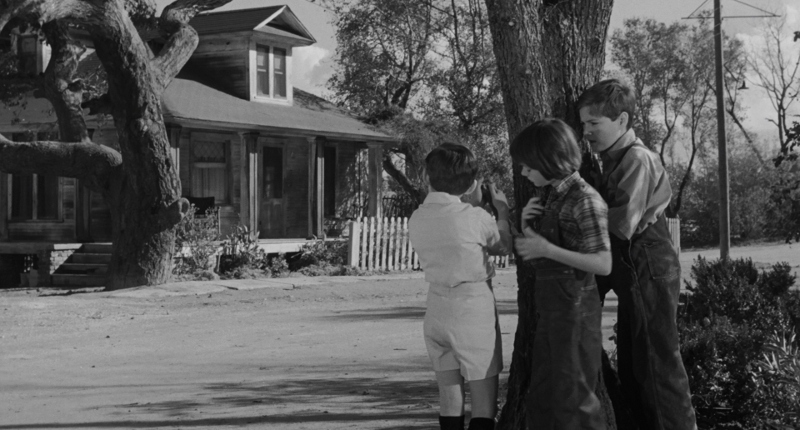 Universal's new Gregory Peck Centennial Collection celebrates what would have been the late actor's 100th birthday by pairing up two of their existing catalog Blu-rays, To Kill A Mockingbird and Cape Fear, as a two-disc set with a few printed extras. Both released in 1962, these films represent a small but memorable slice of Peck's career.
To Kill A Mockingbird, directed by Robert Mulligan and based on Harper Lee's Pulitzer-winning novel, stars Peck in a career-defining role as Atticus Finch, an Alabama lawyer who defends innocent Tom Robinson (Brock Peters) against false rape charges. Atticus' children Scout (Mary Badham) and Jem (Phillip Alford) are onlookers, reacting to their first real perceptions of "grown up problems" with a mixture of curiosity and fear. As with most adaptations, To Kill a Mockingbird chooses portions of the book to dwell on; the focal points are Robinson's trial, racial tensions in rural Alabama, and the children's suspicion of neighbor Arthur "Boo" Radley (Robert Duvall, in his film debut). These themes remind us that we shouldn't fear what we're not familiar with; an appropriate message, especially since both the novel and film were released just as the Civil Rights movement was picking up steam. Even if you didn't grow up in a similar environment, it's not hard to identify with key characters and their differing moral compasses. Equally relatable is the children's fear of Radley, who mostly keeps to himself in a house that may as well be haunted. Robinson's legal situation doesn't exactly lead to a happy ending, but the children's final moments with their neighbor are touching, heartfelt, and believable from both angles. To Kill A Mockingbird never treads too lightly on either path: it balances the wonders/fears of childhood/adulthood in equal measure, creating what might be the best example of a true "family film" as you're likely to see. It's cemented by excellent performances (especially Peck, who earned an Oscar for his efforts), an award-winning screenplay and art direction, a memorable score by Elmer Bernstein, and cinematography rich with detail. And though I've never quite warmed up to Kim Stanley's syrupy voice-over narration, it's a small price to pay for such a timeless and engaging film. Simply put, To Kill A Mockingbird is a "total package" production, so it's continued popularity with audiences and critics shouldn't surprise anyone.
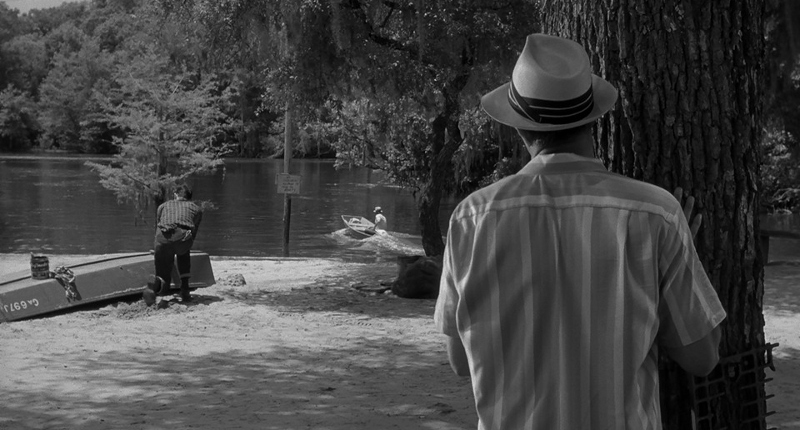 Cape Fear, directed by J. Lee Thompson, is much darker but extremely suspenseful and entertaining in its own right. Peck once again stars as a straight-shooting lawyer, Sam Bowden, but this time the cool and collected father is pushed to his breaking point by sleazy ex-con Max Cady (Robert Mitchum). Cady's out after an eight year prison sentence for a violent rape that Bowden broke up, so he's looking for revenge against the main who helped him away. Bowden's wife Peggy (Polly Bergen) and daughter Nancy (Lori Martin) also become targets, as is an unfortunate drifter (Barrie Chase) who gets assaulted in her motel room. Struggling to maintain his composure while battling paranoia, Sam works with police chief Mark Dutton (Martin Balsam) and a private investigator (Telly Savalas) to protect his family, unsure of where to draw an exact line between primal protection and following the law. Though Cape Fear puts us through the wringer and clearly manipulates its audience (rarely painting Cady as anything more than an over-the-top monster), it's still a textbook example of shock delivered without graphic details. Peck and Mitchum turn in great performances, well-cast in their respective roles in the same way that Nick Nolte and Robert De Niro were in Martin Scorsese's excellent 1991 remake. I'm less enthusiastic about Bernard Hermann's score; though not without a few highlights, it feels too derivative of earlier work (Psycho, for starters) and ends up overselling some of the suspense at times. Still, it's an engaging ride from start to finish, as Cape Fear poses interesting questions about the nature of justice and premeditation while delivering no shortage of thrills and chills.
Please note that both discs in this collection are 100% identical to Universal's previous Blu-rays (right down to the disc art), with the only differences being the outer packaging. So unless you don't own either of these titles already, you're probably better off skipping this collection or picking up one of the separate releases.
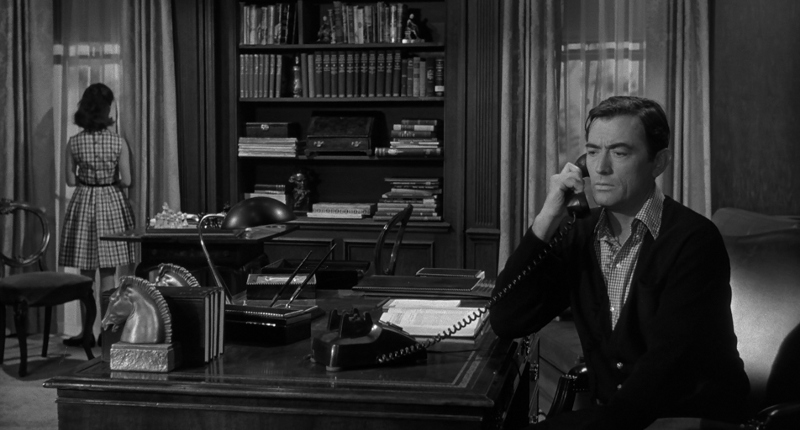
Both To Kill A Mockingbird and Cape Fear are presented in their original 1.85:1 aspect ratios but look much different than one another. The latter appears to be in overall better shape: although a series of optical push-ins (flat zooms on the film itself, not traditional in-camera zooms) have always looked a little problematic, grain levels and detail are better preserved. Cape Fear, on the other hand, has been smothered in digital noise reduction and, though not without texture and fine detail at times, the overall image appears much flatter in comparison. Still, both 1080p transfers are very clean with strong black levels and good contrast...so as much as I'd have loved to see Cape Fear without the processed appearance, it still looks better than some catalog titles from the same era. The DTS-HD 2.0 Master Audio tracks, on the other hard, are both excellent with occasional depth and clear dialogue. I mentioned earlier that Bernard Hermann's score on Cape Fear occasionally feels mixed a little too strongly, but it's always sounded that way to me on DVD and Blu-ray. Spanish and French dubs are also included (no Spanish on Mockingbird), as well as optional English SDH, French, and Spanish subtitles (no French on Cape Fear).
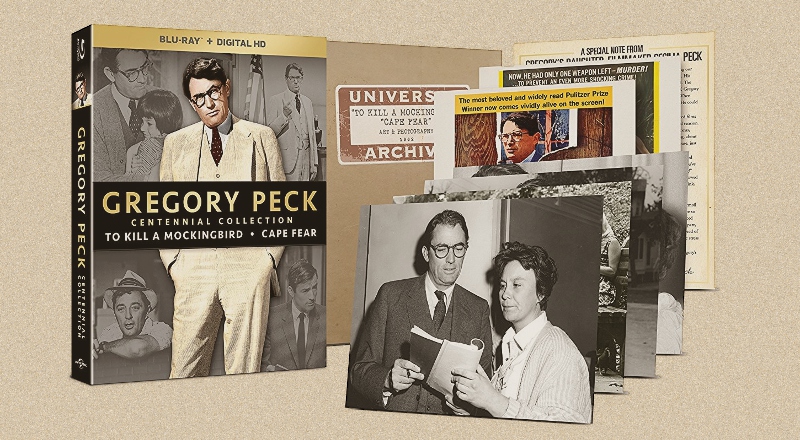
Cape Fear, on the other hand, has much less in the way of supplements but what's here is still enjoyable. The mid-length "Making of Cape Fear" (28 minutes) includes interviews with Gregory Peck and director J. Lee Thompson; it provides a well-rounded account of the film's production, development, and words about the cast. We also get the Theatrical Trailer (2 minutes) and a self-playing series of Production Photographs (5 minutes).
Gregory Peck's 100th birthday would've been earlier this year, and Universal's well-meaning but decidedly meager Centennial Collection does little more than repackage two Blu-rays that most fans already own. But if you don't, it's a convenient way to get two great movies at once: both To Kill A Mockingbird and Cape Fear are enjoyable for entirely different reasons...not the least of which are fine lead performances by Peck, who plays two similar characters with their own unique set of challenges. While Universal's excessive use of DNR still plagues Cape Fear (and, to a lesser extent, To Kill A Mockingbird), these are otherwise great discs with several hours' worth of supplements between them and it's definitely priced to sell for the holiday season. This two-disc set is firmly Recommended to newcomers or those who haven't bought either film on Blu-ray yet; otherwise, you can safely skip it.
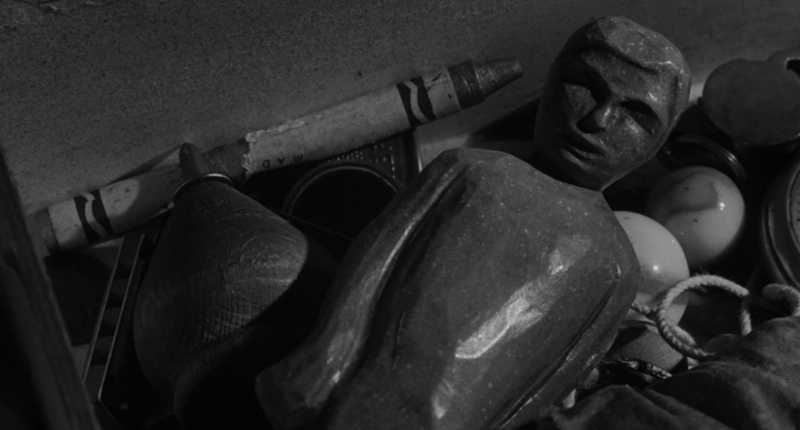 |
|
| Popular Reviews |
| Sponsored Links |
|
|
| Sponsored Links |
|
|
| Release List | Reviews | Shop | Newsletter | Forum | DVD Giveaways | Blu-Ray | Advertise |
|
Copyright 2024 DVDTalk.com All Rights Reserved. Legal Info, Privacy Policy, Terms of Use,
Manage Preferences,
Your Privacy Choices | |||||||












